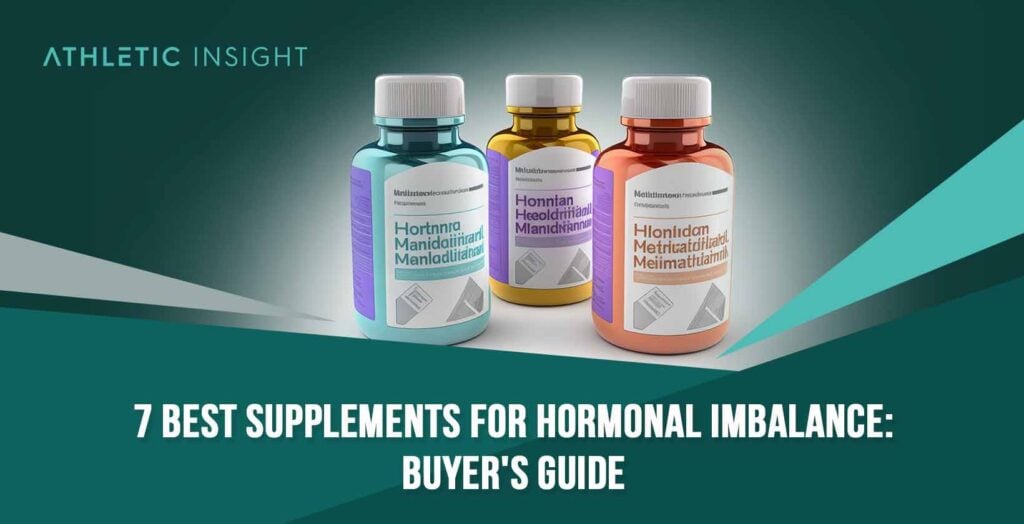Which Supplement Is Best For Hormonal Imbalance

The tightrope walk of hormonal balance is a challenge faced by millions, primarily women, navigating conditions from polycystic ovary syndrome (PCOS) to menopause. The quest for relief often leads down a labyrinthine path of supplements, each promising a return to equilibrium. But amidst the cacophony of claims, which supplement truly rises above the noise and offers legitimate support for hormonal health?
The following article will provide an overview on which supplement is the best for hormonal imbalance. This is done by exploring the scientific evidence, scrutinizing popular options, and separating hype from substantiated benefit. We will explore different perspective with the goal of providing readers with the information needed to make informed decisions, always emphasizing the importance of consulting with healthcare professionals.
Understanding Hormonal Imbalance and Its Impact
Hormonal imbalances occur when there is too much or too little of a hormone in the bloodstream. This can lead to a wide range of symptoms affecting mood, metabolism, reproductive health, and overall well-being.
Conditions like PCOS, thyroid disorders, and perimenopause are often characterized by significant hormonal fluctuations. These fluctuations trigger symptoms that can severely impact quality of life.
The Supplement Landscape: A Crowded Field
The market for supplements claiming to balance hormones is vast and ever-growing. From ancient herbal remedies to modern formulations, consumers are bombarded with options.
Navigating this landscape requires a discerning eye and a commitment to evidence-based decision-making. The popularity of a supplement does not necessarily equate to its efficacy or safety.
Inositol: A Promising Contender
Inositol, a type of sugar involved in cell signaling, has garnered significant attention for its potential to improve hormonal imbalances. Studies have shown its benefits, particularly in women with PCOS.
Research suggests that inositol can improve insulin sensitivity, regulate menstrual cycles, and even improve fertility outcomes. It helps in reducing androgen levels, a key factor in many PCOS symptoms.
A systematic review published in the International Journal of Endocrinology highlighted inositol's positive effects on ovulation and metabolic parameters in women with PCOS.
Vitamin D: More Than Just Sunshine
Vitamin D, often associated with bone health, also plays a crucial role in hormonal regulation. Deficiencies are common and can exacerbate hormonal imbalances.
Studies have linked low Vitamin D levels to an increased risk of PCOS and irregular menstrual cycles. Supplementation can help restore optimal levels and support hormonal balance.
The Endocrine Society recommends maintaining adequate Vitamin D levels for overall health and potentially mitigating hormonal issues.
Omega-3 Fatty Acids: The Anti-Inflammatory Powerhouse
Omega-3 fatty acids, found in fish oil and flaxseed, possess potent anti-inflammatory properties. Chronic inflammation can disrupt hormonal balance, making omega-3s a valuable addition to a holistic approach.
Research suggests that omega-3s can help reduce androgen levels and improve insulin sensitivity, particularly in women with PCOS. They can also support cardiovascular health, which is often compromised in individuals with hormonal imbalances.
Other Notable Mentions
Several other supplements have been investigated for their potential to support hormonal balance. These include magnesium, zinc, and certain herbal remedies like chasteberry (Vitex).
Magnesium plays a role in hundreds of bodily functions, including hormone production and regulation. Zinc is essential for thyroid function and can influence hormone receptor activity.
Chasteberry has traditionally been used to alleviate symptoms of premenstrual syndrome (PMS) and may help regulate menstrual cycles. However, evidence supporting its widespread use is still evolving.
The Importance of Personalized Approach and Professional Guidance
It's crucial to recognize that there is no one-size-fits-all solution when it comes to hormonal imbalances. What works for one individual may not work for another.
Underlying causes, individual sensitivities, and interactions with other medications must be carefully considered. Self-treating with supplements can be risky and may even worsen the problem.
Consulting with a healthcare professional, such as an endocrinologist or a registered dietitian specializing in hormonal health, is paramount. They can conduct thorough evaluations, identify specific imbalances, and recommend a personalized treatment plan.
Debunking the Myths and Avoiding Pitfalls
The supplement industry is rife with misleading claims and exaggerated promises. Be wary of products that claim to offer quick fixes or miracle cures.
Look for supplements that have been independently tested for purity and potency. Third-party certifications, such as those from NSF International or USP, can provide assurance of product quality.
Avoid products that contain proprietary blends, as the exact ingredients and dosages are often obscured. Transparency is key when choosing supplements for hormonal health.
Looking Ahead: The Future of Hormonal Health Supplementation
Research into the role of supplements in hormonal balance is ongoing and constantly evolving. As our understanding deepens, we can expect to see more targeted and effective interventions.
Personalized nutrition, based on individual genetic profiles and hormonal assessments, is likely to become increasingly prevalent. This will allow for more precise and tailored supplement recommendations.
The integration of technology, such as wearable sensors and mobile apps, will also play a role in monitoring hormonal fluctuations and tracking the effectiveness of supplement interventions.
Conclusion
While no single supplement can definitively be crowned the "best" for all hormonal imbalances, certain nutrients and compounds show considerable promise. Inositol, Vitamin D, and omega-3 fatty acids have demonstrated benefits in specific populations.
It is imperative to approach supplementation with caution and under the guidance of a qualified healthcare professional. They can help determine the underlying cause of the imbalance and recommend a safe and effective treatment plan.
By combining evidence-based supplementation with a holistic approach that addresses lifestyle factors, individuals can take meaningful steps toward restoring hormonal harmony and improving their overall well-being.


















